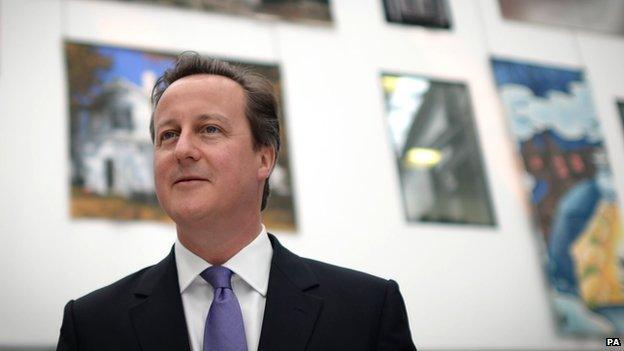Clegg: UK must reject EU 'insularity and chauvinism'
- Published
Nick Clegg tells Nick Robinson about the case for EU membership
Nick Clegg has warned against letting the "forces of insularity and chauvinism" dictate Britain's future in Europe.
In a speech in Oxford, the Lib Dem leader said the UK must continue to fight for its values within the EU or "hand the keys" to France and Germany.
The EU is the "most successful example of international co-operation in modern history" but needs reform, he said.
But one report says the Lib Dems expect a "difficult" time in European polls.
The Press Association quoted a Lib Dem aide as saying: "We are fighting these elections in much more difficult circumstances than we did last time around, as a party of government and in the face of, frankly, some quite extensive hostility in the country towards Europe."
The party is defending 12 seats in the European Parliament in the 22 May election but has been trailing the Conservatives, Labour and UKIP in the opinion polls.
The Lib Dems have styled themselves as the "party of in", trumpeting the benefits to trade and jobs of remaining an influential voice within the 28-member bloc.
But, on Tuesday, the deputy prime minister said the UK's future in Europe is a "debate of the heart, not just the head, a vital debate, in the end, about who we are".
'False patriots'
Mr Clegg questioned why UKIP, some Conservative MPs and other "isolationists" want to walk away from the EU when the UK has won "so many of the big arguments" about the organisation's purpose and direction.
He argued that the UK was central to the development of the EU single market and to the enlargement of the organisation after the end of the Cold War, spreading political freedom and economic opportunity eastwards.
"It (the European Union) has British fingerprints all over it... So far from being foisted on passive and reluctant British governments, the European project has long been shaped by Britain.
"The great irony behind the claim that we should leave the EU because it is somehow anti-British is that we would be doing so just as the big principles we have long advanced - openness, competition, free trade, are enjoying greater continental consensus than ever."
Those wanting to leave the EU, he claimed, are "false patriots" who will leave the UK isolated and weakened.
"If the forces of insularity and chauvinism get their way, they will ensure that Britain no longer benefits from the political and economic advances in Europe that we have shaped.
"And they will hand the keys to running our European continent to the Germans, French and others while we retreat across the English Channel."
The Lib Dem leader rejected suggestions his party is "starry-eyed" about Brussels, saying it needs to be reformed to do "more of what it is good at and less of what it isn't".

Prime Minister David Cameron dismissed his deputy's analysis of the link between patriotism and Euroscepticism.
"You can be deeply patriotic and love your country and believe that its place belongs inside the EU, or you can be deeply patriotic, love your country and believe you belong outside the EU," he told BBC Radio 4's Today programme.
"Your patriotism is not defined by your position on this question. Your patriotism is defined by your love of your country, its institutions, its history, what it can do in the world."
He repeated the Conservatives' belief that the UK should reform its relationship with the EU.
"We want our membership of this organisation to be about cooperation between member states, not the building of a superstate," he said.
'Meddling'
When Mr Clegg debated with UKIP leader Nigel Farage last month, he was criticised in some quarters when he said he expected the EU to be "broadly similar" in 10 years' time to what it is now.
The Lib Dems have said a referendum would only be justified if more powers were handed from the UK to Brussels and oppose the Conservatives' plan for a renegotiation followed by a public vote in 2017.
In his speech, Mr Clegg said the EU must "stop meddling" in things which are the preserve of member states and national parliaments should have the right to reject "unacceptable" proposals.
But he said that greater co-operation must be pursued "relentlessly" where it will result in greater prosperity and stability.
In an apparent effort to manage expectations ahead of Thursday's poll, a party source told the Press Association that the Lib Dems had polled 13% in 2009 when politics conditions were more "benign".
"We want to return as many Liberal Democrat MEPs and councillors as possible," they said.
The source added: "It's going to be a difficult night for the Liberal Democrats on Thursday. We are fighting this election as a party of government... by definition we've not fought a Euro-election like that before."